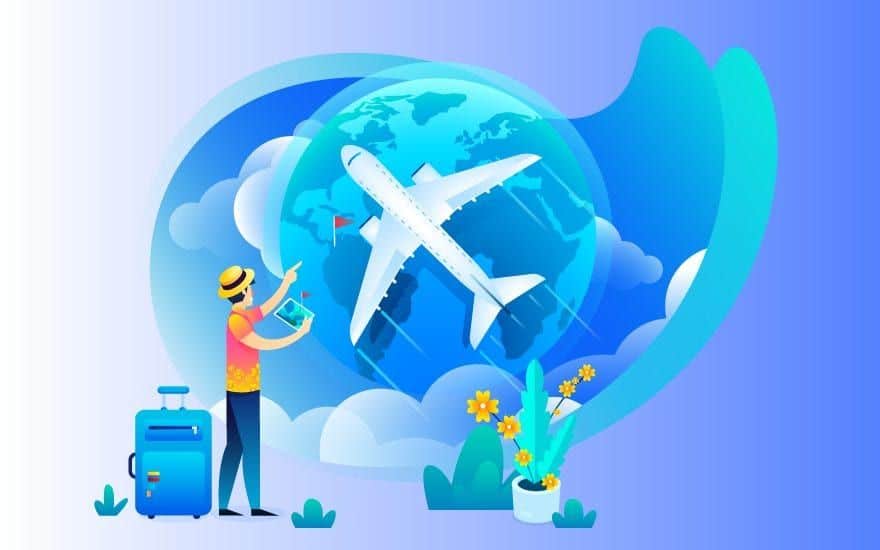The Impact of Artificial Intelligence on the Travel Industry


As the world becomes more technologically advanced, various industries are adopting artificial intelligence (AI) to enhance their services and make them more efficient. The travel industry is no exception to this trend.
In this blog post, we will explore how AI is revolutionizing the travel industry and the various benefits it provides to travelers.

Before we delve into the topic, let’s define what AI is.
Artificial intelligence is a branch of computer science that focuses on creating intelligent machines that can perform tasks that typically require human intelligence, such as problem-solving, decision-making, and language understanding.
The travel industry faces various challenges, such as providing personalized travel experiences, improving customer service, enhancing transportation and logistics, and delivering an exceptional travel experience. Fortunately, AI can help overcome these challenges and transform the industry.
How AI is Transforming the Travel Industry
1. AI-Powered Travel Planning and Booking
AI can help travelers personalize their travel experience by providing customized recommendations and itineraries based on their preferences, budget, and past travel behavior.
AI algorithms can analyze vast amounts of data, such as flight schedules, hotel rates, and popular tourist attractions, to provide tailored recommendations in your travel app development.
Additionally, chatbots are becoming a popular tool for enhancing the booking experience. Chatbots can provide real-time assistance to travelers, answer their questions, and handle their bookings. This enhances the booking process and saves time for travelers and travel agents.
2. AI-Driven Customer Service
AI is also transforming the customer service experience in the travel industry. With the help of intelligent virtual assistants, travelers can receive 24/7 support from anywhere in the world. These virtual assistants can handle customer inquiries and complaints, make travel arrangements, and provide real-time translation services for global travelers.
3. Smart Transportation and Logistics
AI algorithms can optimize transportation and logistics operations for airlines and cruise lines. For instance, AI-powered route optimization can help airlines and cruise lines plan the most efficient routes to reduce fuel costs, minimize travel time, and enhance travel experience.
Self-driving and autonomous vehicles are also becoming more common in the travel industry.
These vehicles enhance safety and provide more efficient travel. Predictive maintenance and real-time updates can also be provided to transportation systems using AI to avoid delays and improve the travel experience.
4. Enhanced Travel Experience
AI can provide a more immersive travel experience by powering virtual tour guides and companions. These companions can provide personalized recommendations based on a traveler’s interests and previous travel behavior. Additionally, intelligent hotel rooms with voice-controlled amenities can enhance the travel experience.
Augmented reality is another technology becoming more popular in the travel industry. Travelers can use their smartphones to view an augmented reality overlay of a city or tourist attraction, providing them with more context and information.
Addressing Concerns and Ethical Considerations
As with any new technology, there are concerns about the ethical use of AI in the travel industry. Addressing these concerns and ensuring that AI is used responsibly and ethically is essential.
1. Data Privacy and Security
One of the main concerns about using AI in the travel industry is data privacy and security. Travelers often provide sensitive information such as passport details, credit card information, and travel itineraries when booking trips. It is essential to ensure this information is safeguarded and protected from data breaches and cyber-attacks.
Travel companies should implement robust security measures to prevent data breaches and ensure that personal information is stored securely. They should also be transparent about using customer data and obtain consent for any data usage.
2. Job Displacement and Workforce Changes
Another concern about using AI in the travel industry is the potential impact on jobs. As AI becomes more prevalent, specific jobs may become automated or obsolete.
It is essential to emphasize the need for reskilling and adapting to new roles in the industry. This can help employees remain competitive and relevant in a rapidly changing landscape. There may also be opportunities for employment in AI-related fields such as data analysis, programming, and AI development.
3. Ethical Use of AI in Travel
Finally, ensuring that AI is used ethically in the travel industry is essential. This means ensuring fairness, avoiding bias in AI algorithms, and being transparent about AI decision-making processes.
It also means being responsible for using customer data for personalized experiences. Travel companies should ensure that customer data is used in a way that respects privacy and does not compromise personal information.
Conclusion
AI is revolutionizing the travel industry, from personalized recommendations and enhanced booking experiences to intelligent transportation, logistics, and immersive travel experiences. While there are concerns about the ethical use of AI in the industry, it is essential to address these concerns and ensure that AI is used responsibly and transparently.
The future of AI in travel is bright, and travelers can look forward to a more personalized, efficient, and immersive travel experience. As AI continues evolving and improving, it will undoubtedly play a more significant role.
Frequently Asked Questions (FAQs)
Q. How is AI improving travel planning and booking?
A. AI improves travel planning and booking by providing personalized recommendations and itineraries based on traveler preferences and behavior. It is also streamlining the booking experience through chatbots and other AI-powered tools.
Q. Will AI replace human customer service representatives in the travel industry?
A. While AI is becoming more prevalent in the travel industry, it is likely to replace human customer service representatives partially. AI can assist in handling customer inquiries and complaints, but the travel industry will always need human interaction and empathy.
Q. What are the benefits of using AI in transportation and logistics?
A. The benefits of AI in transportation and logistics include route optimization for airlines and cruise lines, self-driving cars and autonomous vehicles for safer and more efficient travel, and predictive maintenance and real-time updates for transportation systems.
Q. Are there any concerns regarding the use of AI in the travel industry?
A. Yes, there are concerns regarding the use of AI in the travel industry, such as data privacy and security, potential job displacement, and ethical considerations in using AI algorithms and customer data.
Q. How can travelers protect their data privacy when using AI-powered services?
A. Travelers can protect their data privacy by choosing reputable travel companies with robust security measures. They should also read and understand the company’s data usage policies and give consent for any data usage.
Read more related articles:
Disclaimer
In line with the Trust Project guidelines, please note that the information provided on this page is not intended to be and should not be interpreted as legal, tax, investment, financial, or any other form of advice. It is important to only invest what you can afford to lose and to seek independent financial advice if you have any doubts. For further information, we suggest referring to the terms and conditions as well as the help and support pages provided by the issuer or advertiser. MetaversePost is committed to accurate, unbiased reporting, but market conditions are subject to change without notice.
About The Author
Damir is the team leader, product manager, and editor at Metaverse Post, covering topics such as AI/ML, AGI, LLMs, Metaverse, and Web3-related fields. His articles attract a massive audience of over a million users every month. He appears to be an expert with 10 years of experience in SEO and digital marketing. Damir has been mentioned in Mashable, Wired, Cointelegraph, The New Yorker, Inside.com, Entrepreneur, BeInCrypto, and other publications. He travels between the UAE, Turkey, Russia, and the CIS as a digital nomad. Damir earned a bachelor's degree in physics, which he believes has given him the critical thinking skills needed to be successful in the ever-changing landscape of the internet.
More articles

Damir is the team leader, product manager, and editor at Metaverse Post, covering topics such as AI/ML, AGI, LLMs, Metaverse, and Web3-related fields. His articles attract a massive audience of over a million users every month. He appears to be an expert with 10 years of experience in SEO and digital marketing. Damir has been mentioned in Mashable, Wired, Cointelegraph, The New Yorker, Inside.com, Entrepreneur, BeInCrypto, and other publications. He travels between the UAE, Turkey, Russia, and the CIS as a digital nomad. Damir earned a bachelor's degree in physics, which he believes has given him the critical thinking skills needed to be successful in the ever-changing landscape of the internet.


















































